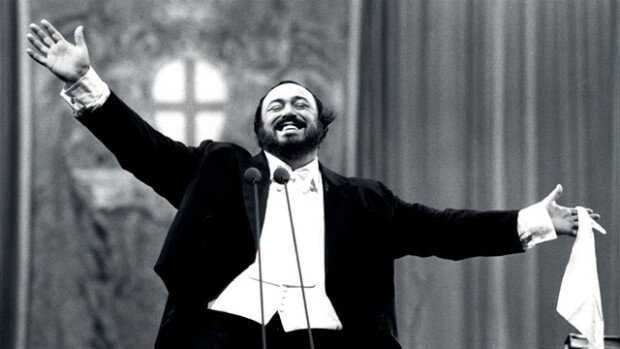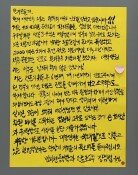Pavarotti as the greatest voice of tenors
Pavarotti as the greatest voice of tenors
Posted December. 23, 2019 07:33,
Updated December. 23, 2019 07:33

About half of sound tracks in the documentary movie “Pavarotti,” directed by Ron Howard, is filled with opera arias composed by Giacomo Puccini (1858∼1924).
Tenor Luciano Pavarotti (1935∼2007) was an outstanding interpreter of Puccini’s operas, but moviegoers did not expect that his life reinstated in the documentary will remind us of Puccini’s life. Both were tall and friendly men. Puccini, who was melancholic and dandy, looks very different from obese Pavarotti, who smiles innocent smile while opening his arms. However, both men became the maestros of vocal classical music who fascinate people around the world after spending youth amid large families consisting of many women.
The movie is a typical conventional documentary in style. There are no hints of exception. Instead, the entire life of this interesting artist itself elevates fun and excitement to fascinate watchers to be stuck to the screen. The movie features video footages and testimonies of countless celebrities including Princess Diana, his ‘own colleagues’ Placido Domingo and Jose Carreras, and pianist Lang Lang, who was thrilled to hear about Pavarotti’s visit to China during his childhood.
He earned harsh criticisms from his long-term fans and critics when he staged joint performances with popular music singers including Bono of the rock band U2, while distancing himself from the opera stage after the 1990s. This situation happened despite his ample contributions to philanthropic causes throughout his career. The director faithfully conveys the opinions and stances of people around the late tenor. The movie suggests that Pavarotti’s interaction with the rich and famous including Princess Diana, and personal interests of his new love, Nicoletta Mantovan, during his later years brought him to a whole new world.
This would be the true reality that the movie does not reveal however. Pavarotti’s choice in itself was wise to some extent. When it became clear that “Pavarotti of the time” would not overcome “Pavarotti of the past,” he expanded the scope of his activities. Till the last day of his life, his voice remained as warm and shiny as sunshine. However, the weakening of energy that had controlled his voice, and the shortening of his breath that forced his accompanists and fellow vocalists to adjust tempo to him was already apparent from the first “Three Tenors Concert” in 1990.
Pavarotti could boast of the greatest musical instrument, his own vocal organ, among all the tenors that have emerged in the contemporary world. During the best days of his career, his skill to perform this instrument was something that was admired by fans. His rival, Domingo, testifies in the movie that whenever Pavarotti opened his mouth, he generated all different sounds. However, Pavarotti was inferior to Domingo in terms of the skills to manage this instrument.
This writer watched the movie, recalling the memories of the time when I listened to his first live concert in Korea that I recorded in my cassette tape in 1977 in that winter until the tape was worn out. “He was superior to ordinary people. He was very generous, and an extraordinarily great singer,” his divorced wife Madua says in the closing part of the movie. I was happy to look into such life of the great singer. Music that accompanied was too beautiful to be labeled a bonus. The movie, rated 12, will hit box office on January 1, next year.
gustav@donga.com
Headline News
- Med professors announce intention to leave hospitals starting Thursday
- Bridge honoring Sgt. Moon Jae-sik unveiled in Pennsylvania
- Chief of Staff Chung tells presidential secretaries to stay away from politics
- US FTC bans noncompete agreements
- N. Korea launches cyberattacks on S. Korea's defense companies







